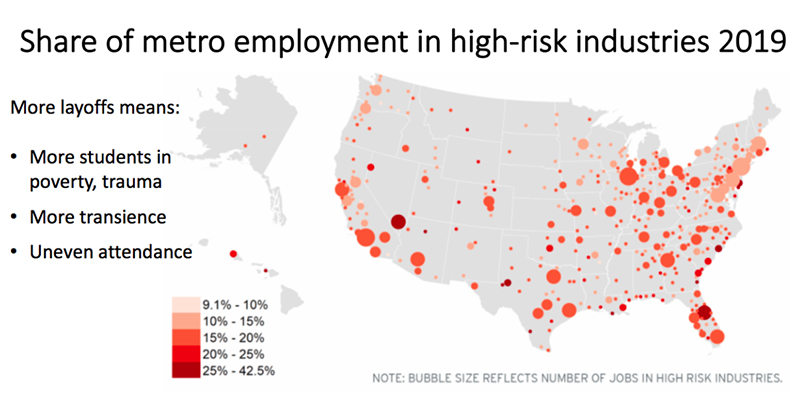School Finance Expert Warns District Leaders to Prepare for ‘Major Financial Upheaval’ From Pandemic

With a recession on the way, states and localities could be making severe cuts to public education over the next year — and many leaders don’t seem to realize it yet.
That was the message delivered this week by Marguerite Roza, one of America’s foremost experts in school finance, in a public webinar. Her presentation to researchers and state policymakers offered a bearish outlook for school funding and turned on stark recommendations for mitigating the crisis: With sources of revenue plummeting in the months ahead, policymakers should keep costs low, communicate frequently and look for opportunities to settle long-term fiscal accounts.
In a follow-up interview with The 74, Roza emphasized the need for quick and careful measures to deal with what could be a “devastating” economic downturn.
A former economic adviser at the Bill and Melinda Gates Foundation and a longtime observer of how money moves through the education system, Roza now serves as the director of Georgetown University’s Edunomics Lab research center, which administered Tuesday afternoon’s online discussion. In the talk, she warned of “major financial upheaval” resulting from the spread of coronavirus.
“Districts are essentially going to have more costs,” she said. “That’s the one-two punch that happens: Revenues will drop while expenses will increase.”
Although funding for the current school year is stable in most areas, the coming months are likely to see incoming funds “plummet,” she explained. The abrupt wave of layoffs, shuttering of businesses and virtual standstill of the travel and leisure industries have put consumption on pause, choking off sales taxes that many states use to fund schools.

At the same time, suddenly reduced teacher turnover — more veteran instructors will keep their relatively secure and high-paying jobs as the labor market goes south — will push up the costs of salary and benefits, she said. Children of newly unemployed and displaced parents will require more social services, and public schools are likely to see a migration of new students previously enrolled at expensive private academies.
These pressures will converge at the same time that state lawmakers are forced to allocate more funding to Medicaid and other programs serving those affected by the recession. All of which argues for a sober approach to budgeting, Roza advised. Hiring should be frozen, promotions delayed.
“We’ve heard people say, ‘Wow, it’s a great time to hire!’” she said. “I would say that it’s horrific to do layoffs, and as much as you can avoid hiring now, I would.”
Cuts are never palatable to teachers or parents, which makes public messaging key. Many constituents, wary of losing popular teachers or favored afterschool programs, “think the district could tap more money if it was just willing to do so,” she said. In fact, special exemptions for some schools always come at the expense of students in another school, a message that often resonates with the public.
In the call with The 74, Roza commented on the federal stimulus, which was still being negotiated midweek. Even a huge relief package would “split the difference, at best,” she remarked, owing to the disparate impact of the coming fiscal problems: Some states will have to cut deeper than their neighbors, and some districts can fall back more easily than others on lucrative local property taxes — but federal funding allocations will be spread evenly across states.
To complicate matters further, influential stakeholders may not understand the challenges they’re facing. Few key players today were in senior positions during the budgetary carnage that followed the Great Recession, when red ink filled district ledgers for years at a time.
“We talk with a lot of financial leaders in school districts, and they weren’t in those positions during the last recession,” she said. “They might have been in grad school or entering an analyst position, and a little more than a decade later, they’re budget directors or CFOs. They don’t have that visceral sense of what’s coming. Somebody asked me what a RIF [reduction in force] was, and I thought, ‘Wow, that’s how long it’s been. They don’t recognize the word anymore.'”
One possible upside of the economic shock? It might provide cover to the growing number of districts already dealing with structural resource problems, most related to unfunded obligations around employee pensions and benefits. By starting a dialogue about the long-term fiscal health of school systems, Roza said, leaders could create room for “emergency-like decisions on things that we’re overdue to address.”
“I hear districts all the time say, ‘We have underenrolled schools all over the place, but politically, we can’t [close them].’ But schools are closed right now, and they may be laying off lots of people next year. It’s like, this is the least of your community’s worries, so maybe get that done.”
Get stories like these delivered straight to your inbox. Sign up for The 74 Newsletter

;)
